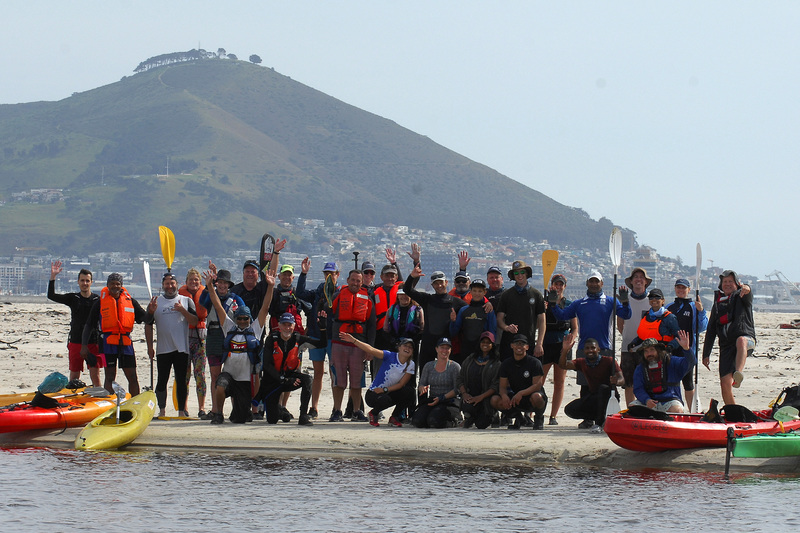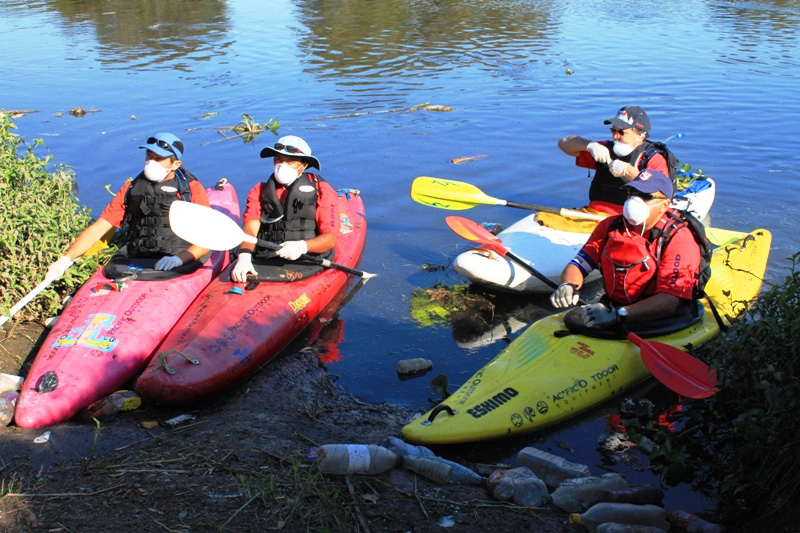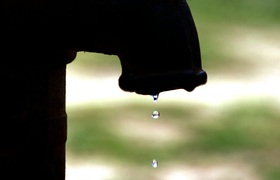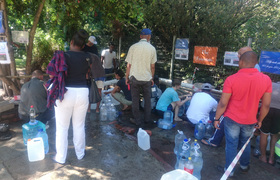Peninsula Paddle: 10 years on
12 August 2019 | Story Kevin Winter. Photos Gavin Lawson. Read time 7 min.
The annual Peninsula Paddle began with four people who wanted to see if it was possible to traverse the Cape Peninsula from Muizenberg to Woodstock beaches in kayaks. A route via canals, rivers and lakes was easy to identify on the map, but the possibility of paddling or pulling kayaks had never been tested before.
More importantly, the intention was always to challenge the City of Cape Town and its citizens about the state of the city’s waterways, which have become nothing more than convenient conduits for disposing solid waste, plastics, material and much more, all of which could potentially find its way into canals, lakes and eventually the sea.
At the heart of the litter problem are two major failures: a systemic failure in which large parts of the city have inadequate waste services, and human behaviour where little thought is given to the consequences of litter and other waste. There is a mix of socially confusing messages that might explain our collective habit: “It’s not cool to pick up litter”; “Litter is the City’s problem”; and “If there is no easy way to recycle – and get rewarded – then why bother?”
A caring understanding of impacts and consequences is failing to change behaviour.
“A caring understanding of impacts and consequences is failing to change behaviour.”
Learning lessons
When the first Peninsula Paddle took place in 2010, conditions were so dire that the paddlers coined the phrase, “The health of the city is seen in its waterways”. It was a rough journey with large sections of the route blocked with solid waste. The Black River section was covered in water hyacinth and simply unnavigable.
The paddle route was purposely chosen to highlight poorer socio-economic sections of the city. The paddlers engaged in conversations with citizens along the route in an effort to understand how they were affected by these waterways. This led to a second important lesson that was used in subsequent Peninsula Paddles: “We are all connected to the city’s waterways”.
It meant that even though people live some distance from a canal or river, their misplaced litter finds its way into stormwater pipelines and eventually to the canals and possibly into sea. So, for example, when drinking straws, cigarette butts and plastic bags – items we so often see in abundance in the canals – are innocently tossed from a passing car, they will likely find a way into these waterways.
The visible impact of this behaviour set the alarms bells ringing for these first paddlers and this began a resolve to raise awareness of the seriousness of the matter by turning the paddle into an annual event. It also raised questions about what we are missing in a city that fails to appreciate the opportunities that are offered by its waterways and how improvements could transform the city. What if our waterways could unlock the spatial divisions across Cape Town by offering shared, public spaces for safe recreation?
Perhaps this is the answer the City of Cape Town wants to achieve by building a water-sensitive city by 2040.

Notable signs of progress
On the eve of the 10th Peninsula Paddle, which will be taking place on 8 September, there are four notable signs of progress:
- The event attracts a diverse group of paddlers from different parts of the city – it is not a ‘middle-class’ thing that so often characterises environmental advocacy. Nearly 300 paddlers have participated in the event since it began, which includes youths from the neighbourhoods of Ottery, Parkwood and Lotus River. This year the Khayelitsha Canoe Club is partnering with the Peninsula Paddle to share knowledge and experience about similar issues in different parts of the city.
- Three weeks after the 2011 Peninsula Paddle, (then) Mayor Patricia de Lille founded an Expanded Public Works Programme employing over 200 people to clean and restore badly degraded rivers and wetlands in the city. These teams of men and women are responsible for removing weeds from choked river systems and the results are visible. In the Black River, for example, magnificent flamingos and other birds regularly stop their daily flight paths across the peninsula to feed in the river. They can see the water now, whereas previously it was covered in aquatic weed. The programme is ongoing and each year the Peninsula Paddle reminds the City about the importance of this programme and the need to sustain it and expand the work.
- In 2019 the City of Cape Town drafted its first water strategy in response to the Day Zero scenario, with an overall vision to become a water-sensitive city by 2040. To do this, the City will need to do things differently like shifting its approach to stormwater infrastructure to sustainable drainage systems, restoring ecological services and protecting urban ecology. The Peninsula Paddle participants were engaged in these kinds of conversations from the outset.
- Managing multiple water bodies with limited data is impossible: “You can’t manage what you can’t measure”. The City collects monthly water samples at nearly 40 sites across the city. While the data provides historical trends, it is difficult to access and single samples provide only a snapshot of water quality at the time of collection. UCT’s Future Water Institute set about addressing this problem by introducing digital sensors and loggers that are capable of delivering near real-time data for a limited number of water quality parameters as well as flow measurement. These instruments have been successfully trialled in the Liesbeek River and form part of an MSc thesis. It is an example of how scientific knowledge is informing new understanding about managing the waterways.
Testing the waters
Each year the water quality is sampled at various points along the Peninsula Paddle route. This year the researchers will take samples to test for bacteria, nutrients and heavy metals and will use the results to compare against previous years. Hopefully the results will suggest that we are heading in the right direction towards cleaner waters.
There are, fortunately, visible signs that parts of the waterways are cleaner, healthier and certainly more navigable than they were in 2010 and 2011.
Read more about taking part in the upcoming Peninsula Paddle on 8 September.
The Peninsula Paddle is sponsored by Abax Investments in key partnership with UCT’s Future Water Institute and Friends of the Liesbeek, and is supported by other community-based organisations such as the Cape Town Environmental Education Trust (CTEET), Khayelitsha Canoe Club, Zandvlei Trust, and the Wildlife and Environment Society of South Africa (WESSA).
 This work is licensed under a Creative Commons Attribution-NoDerivatives 4.0 International License.
This work is licensed under a Creative Commons Attribution-NoDerivatives 4.0 International License.
Please view the republishing articles page for more information.










